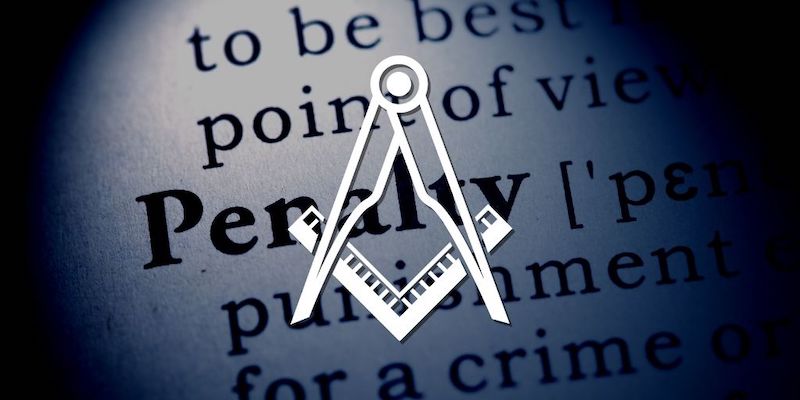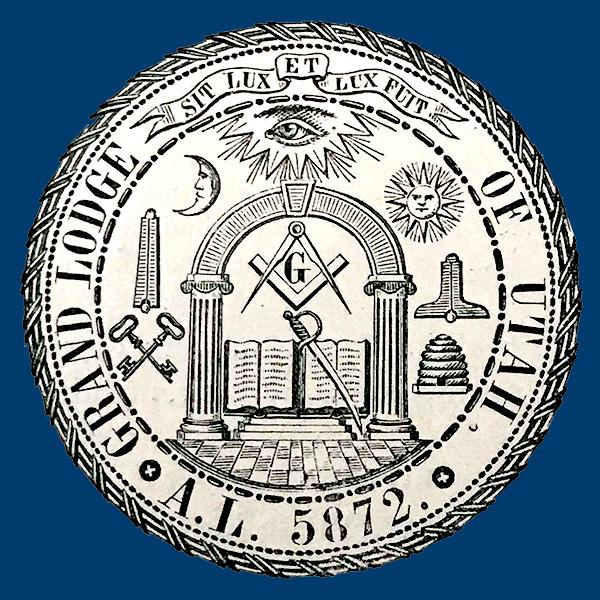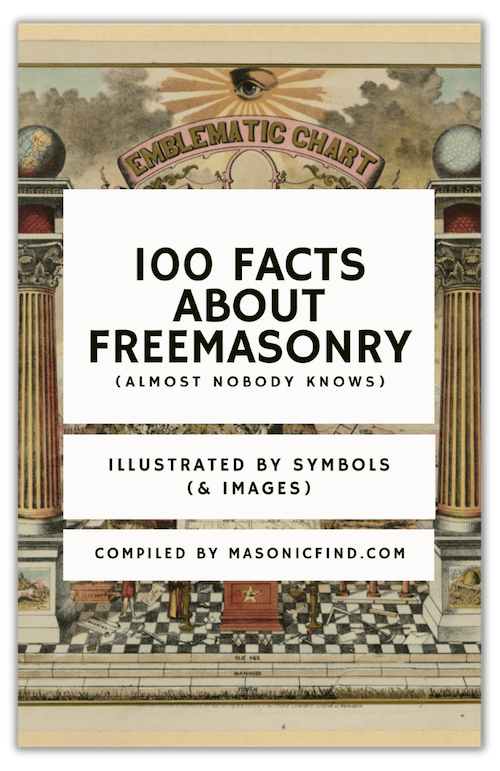Masonry gets a lot of guff from outsiders about the penalties which most grand lodge jurisdictions use in their respective rituals.
What are Masonic penalties and why are there penalties in the first place?
Symbolic penalties illustrate the importance of integrity; literal penalties are for un-masonic conduct.

Symbolic Penalties
In Masonry are penalties that, as stated above, symbolize just how serious we Masons are about our integrity not only as Masons, but also in every other aspect of our lives (as men of faith, brothers, husbands, sons, fathers, citizens, neighbors, and so on).
Many of us native English-speakers will be familiar with that old poetic oath, which some children to this day may still recite when they make a promise:
“Cross my heart and hope to die, stick a needle in my eye.”
Origins
What is a symbolic must, of course, originate from something that was, at one time, literal.
Even before Masonry was ever established, there have been literal penalties established and enforced by various institutions since the beginning of human history. In Jeremiah 34:18-19 (ESV), we read the following:
“And the men who transgressed my covenant and did not keep the terms of the covenant that they made before me, I will make them like the calf that they cut in two and passed between its parts—
“the officials of Judah, and the officials of Jerusalem, the eunuchs, the priests, and all the people of the land who passed between the parts of the calf.”
We also have Proverbs 10:31 (KJV), which says:
“The mouth of the just bringeth forth wisdom; but the froward tongue shall be cut out.”
Throughout time, various nations have had such literal penalties; for example, the British military once rewarded some disciplinary offenses with execution for its own servicemen.
However, given that Freemasonry is merely a Fraternity that promotes moral self-improvement and service to the community, it has never presumed to effect such literal punishments on its members.
Importance
In Masonry, we take obligations upon and unto ourselves to be good, honest men.
Dr Albert Mackey in his Encyclopædia of Freemasonry writes the following under his entry “Penalties”:
“And now the question naturally occurs as to what is the true intent of this obsecration, and what practical operation is expected to result from it. In other words, what is the nature of a penalty attached to an oath, and how is it to be enforced? When the ancient Roman, in attesting with the solemnity of an oath to the truth of what he had just said or was about to say, concluded with the formula, ‘May the gods destroy me,’ it is evident that he simply meant to say that he was so convinced of the truth of what he had said that he was entirely willing that his destruction by the gods whom he had invoked should be the condition consequent upon his falsehood. He had no notion that he was to become outlawed among his fellow-creatures, and that it should be not only the right, but the duty, of any man to destroy him. His crime would have been one against the Divine law, and subject only to a Divine punishment.”
Someone who is a Mason at heart values Truth; by extension, he also values his word.
Literal Penalties

Unmasonic Conduct
Under the Trial Code of the Grand Lodge F&AM of Utah, Masonic offenses are defined as follows:
Masonic Offenses are defined to be:
“First: A violation of the laws of the United States, or of the State in which the offender may reside or be, involving commission of a felony or other offense involving moral turpitude.
“Second: Willful violation of the offender’s obligations as a Mason, of the Constitution or laws of Grand Lodge or of the by-laws of the Lodge in which the offender holds membership.
“Third: Any other act which tends to impair the standing or reputation of the Fraternity before the world.
“Fourth: Any misrepresentation made for the purpose of obtaining the degrees of Freemasonry.”
List of Masonic Offenses:
Violating Masonic Obligations: This includes revealing the secrets of Masonry to non-members, or not adhering to the promises made during the initiation ceremonies.
Unethical or Immoral Conduct: Actions that are considered morally wrong or unethical, both within the lodge and in one’s personal life, can be deemed Masonic offenses. This encompasses criminal activities, dishonesty, fraud, and other serious moral transgressions.
Disharmony within the Lodge: Creating conflict, sowing discord, or engaging in behavior that disrupts the harmony and brotherly love that should prevail in a lodge.
Disobedience to Masonic Authority: Not following the lawful directions of Masonic superiors or disregarding the rules and regulations of the Craft.
Improper Discussion of Politics or Religion: As Freemasonry is non-political and non-sectarian, discussing divisive issues related to politics or religion within the lodge is generally prohibited.
Neglect of Masonic Duties: This can include consistent non-attendance at lodge meetings without a valid reason, failing to pay dues, or not fulfilling the responsibilities of an appointed or elected lodge position.
Reprimand
Unfortunately, there are those who go through the degrees and who do something that goes against the by-laws of his lodge and/or grand lodge. Sometimes, it is a minor error that simply merits correction.
I again quote Dr Mackey, from his same work under the entry “Reprimand”:
“A reproof formally communicated to the offender for some fault committed, and the lowest grade, above censure, of Masonic punishment. It can be inflicted only on charges made, and by a majority vote of the Lodge. It may be private or public. Private reprimand is generally communicated to the offender by a letter from the Master. Public reprimand is given orally in the Lodge and in the presence of the brethren. A reprimand does not affect the Masonic Standing of the person reprimanded.”
Here in Utah, we are charged with the following at the close of most every meeting:
“Remember that you have promised to remind [your Masonic brother], in the most tender manner, of his failings and to aid in his reformation …”
I feel that reprimands fall well within this category of helping our brethren to align their conduct more closely with the standards that we have all agree and obligated ourselves to meet.
However, there are occasionally those who, with a complete disregard for such by-laws, the Masonic community, and even their own integrity, might do something that merits a more severe penalty.
Suspension
The suspension is a temporary deprivation of the rights and privileges of Masonry; it can either be definite (set for a fixed period of time) or indefinite (lasting so long as the Lodge or Grand Lodge sees fit).
Expulsion
According to Mackey on the subject:
“Expulsion is, of all Masonic penalties, the highest that can be inflicted on a member of the Order, and hence it has been often called a Masonic death. It deprives the expelled of all the rights and privileges that he ever enjoyed, not only as a member of the particular Lodge from which he has been ejected, but also of those which were inherent in him as a member of the Fraternity at large.”
Restoration
Restoration in Masonry is, in another word, reinstatement to the Craft of any Mason who has been suspended or expelled. Mackey describes two types of Restoration:
“It may be ex gratia, or an act of mercy, the past offense being condoned; or ex debito justitiæ, by a reversal of the sentence for illegality of trial or injustice in the verdict.
“The restoration ex gratia may be either by the Lodge or the Grand Lodge on appeal. If by the Lodge, it may be to membership, or only to good standing in the Order. But if by the Grand Lodge, therestoration can only be to the rights and privileges of the Order. The Mason having been justly and legally expelled from the Lodge, the Grand Lodge possesses no prerogative by which it could enforce a Lodge to admit one legally expelled any more than it could a profane who had never been initiated.
“But if the restoration be ex debito justitiæ, as an act of justice, because the trial or verdict had been illegal, then the brother, never having been lawfully expelled from the Lodge or the Order, but being at the very time of his appeal a member of the Lodge, unjustly or illegally deprived of his rights, the restoration in this case by the Grand Lodge must be to membership in the Lodge. Any other courses, such as to restore him to the Order but not to membership, would be manifestly unjust. The Grand Lodge having reversed the trial and sentence of the subordinate Lodge, that trial and sentence become null and void, and the Mason who had bene unjustly expelled is at once restored to his original status ….”
Conclusion
Does Masonry have literal penalties? Absolutely.
Are they the gory, offensive ones that you hear conspiracy theorists rattling on about? Absolutely not.
We pride ourselves on being men of Truth and integrity, which form the core of the principles of Freemasonry.

FREE DOWNLOAD: 100 FACTS ABOUT FREEMASONRY (ALMOST NOBODY KNOWS)
Join the 10,000+ Brethren from around the world inside our weekly Masonic newsletter and get our best selling ebook for free (usual value: $20).
This article was written for MasonicFind.com by Brandon Cole, SW.
Brethren,
Great website, and wonderful paper that could be used as a lecture in Lodge of Instruction.
The artist William Hogarth cleverly concealed all the penalties of the degrees within his prints of A Harlots Progress (1732). He also hid the signs and a few passwords so cleverly in these pictures.
If you can prove to me that you are a brother, I will send you a pdf that shows all this and more!
Fraternally,
Bro. Hogarth